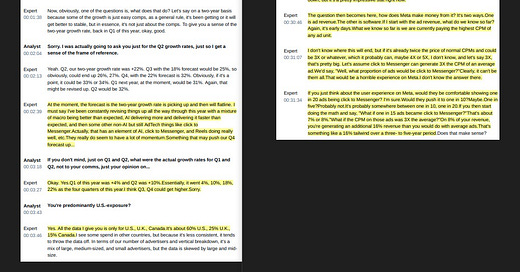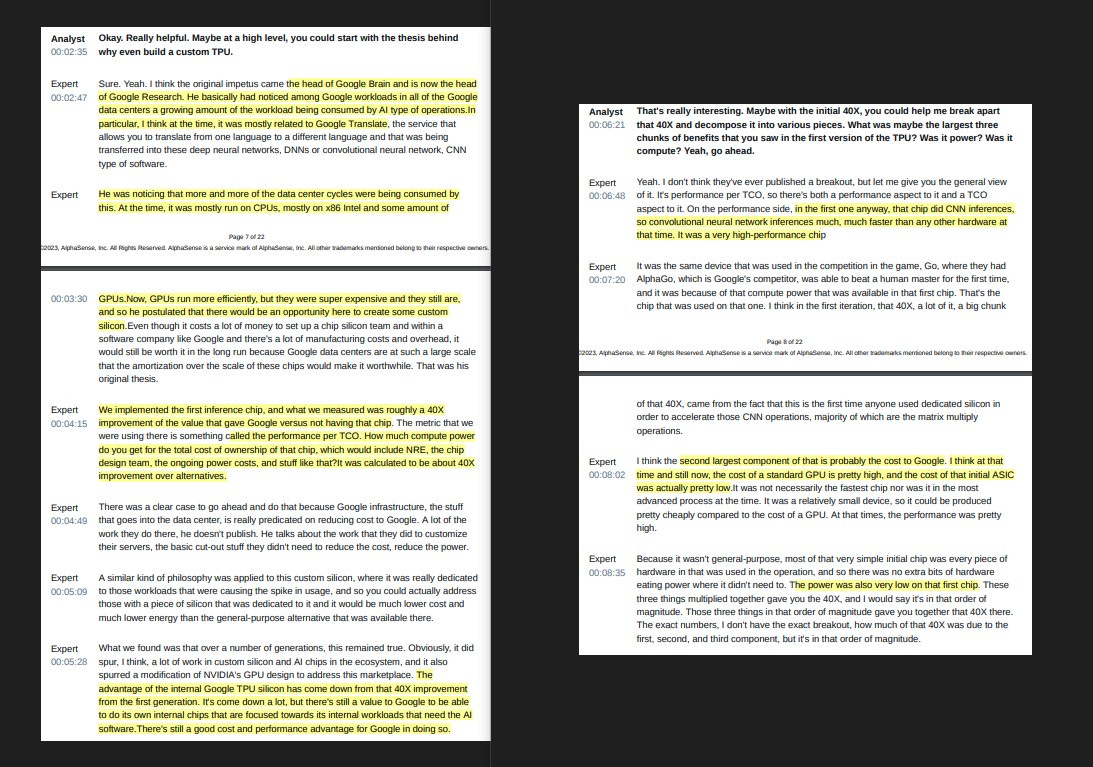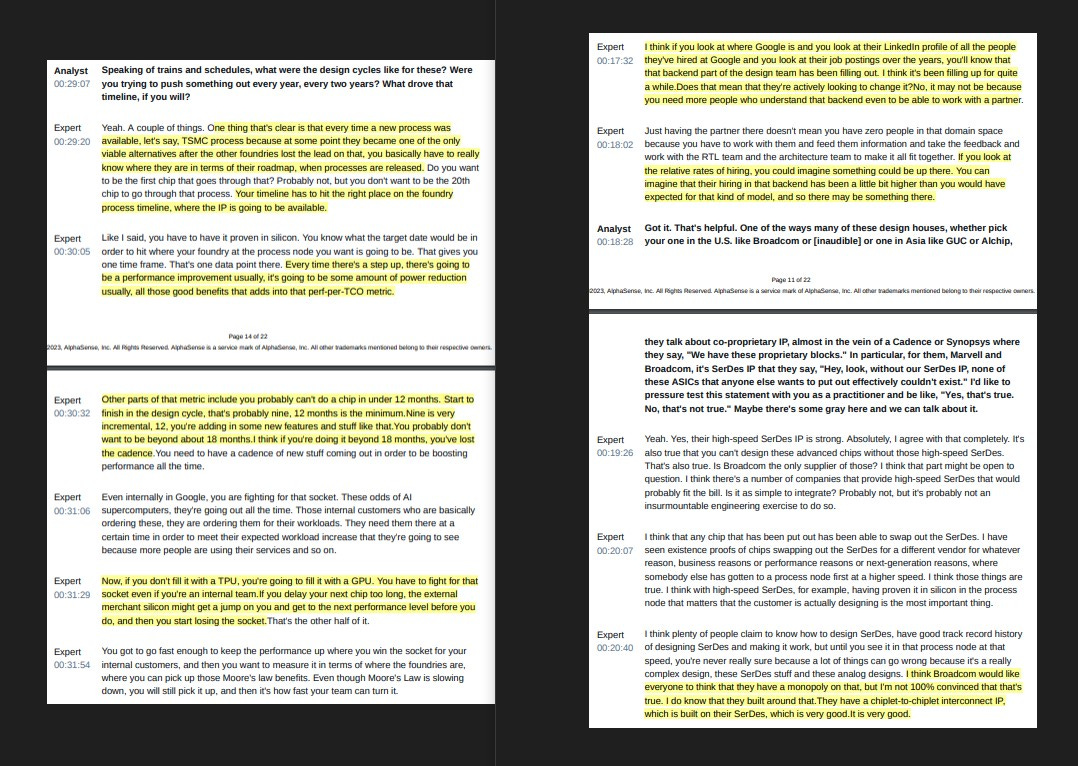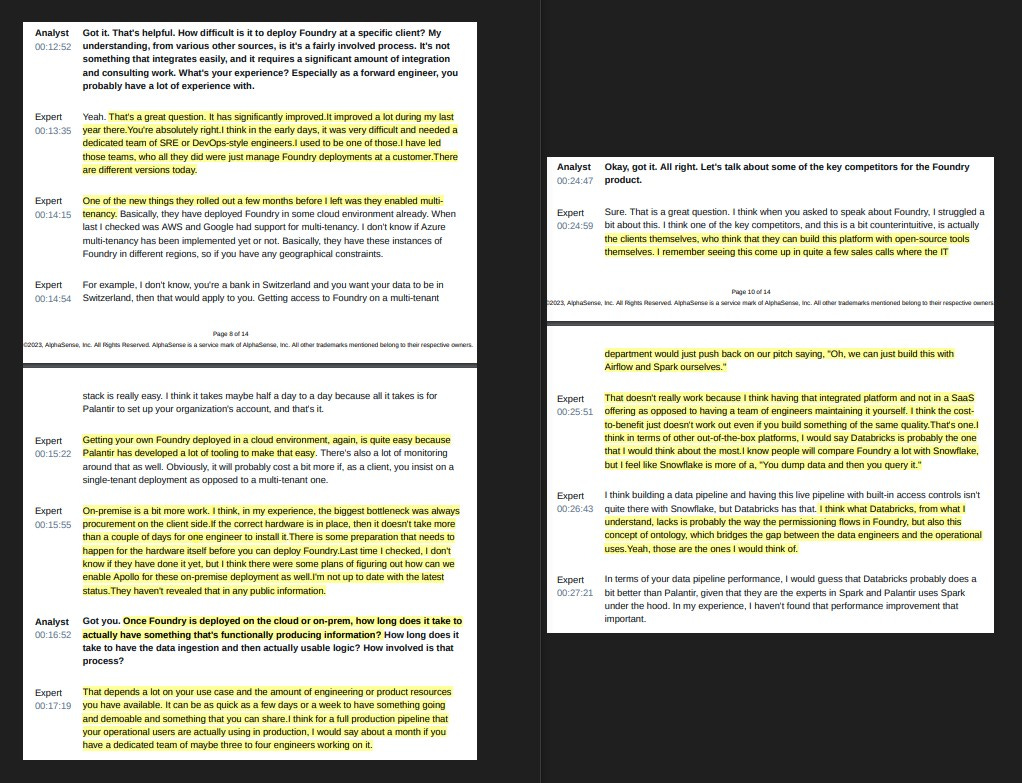Uncover Tech Insights - October 9-13
Weekly market stock moves
Expert interviews
Ad industry expert shares what he sees in terms of ad spending right now, more specifically on Meta:
Spend on Meta has been trending up. According to the data they are seeing from several advertisers, their Meta spend was up +18% for August. Q4 also looks promising, with some budgets being increased.
Some AI Meta tools are already showing results. Meta’s AI background generator. After using it, they first started seeing a click-through rate improvement of about 5%, now 8%.
If a company sends a message via WhatsApp or other chat platforms, the open rate is 4x higher than email from what the expert is seeing. The expert thinks this will be lower once more advertisers start using it. At the same time, the CPM for Click-to-Messenger ads is 3x the average CPM. The expert thinks that could result in a 16% tailwind for Meta over a 3-5 year period.
Amazon ad spending is continuing to grow nicely, albeit at a more predictable pace.
The expert thinks about a year ago when Meta was pushing unmonetized Reels, they increased the ad load on News Feed and Stories. Now, he believes they are scaling that down somewhat because monetization on Reels is picking up. Last August, Reels ad load was 15%; this August, he sees it at 25%, which is close to the maximum ad load.
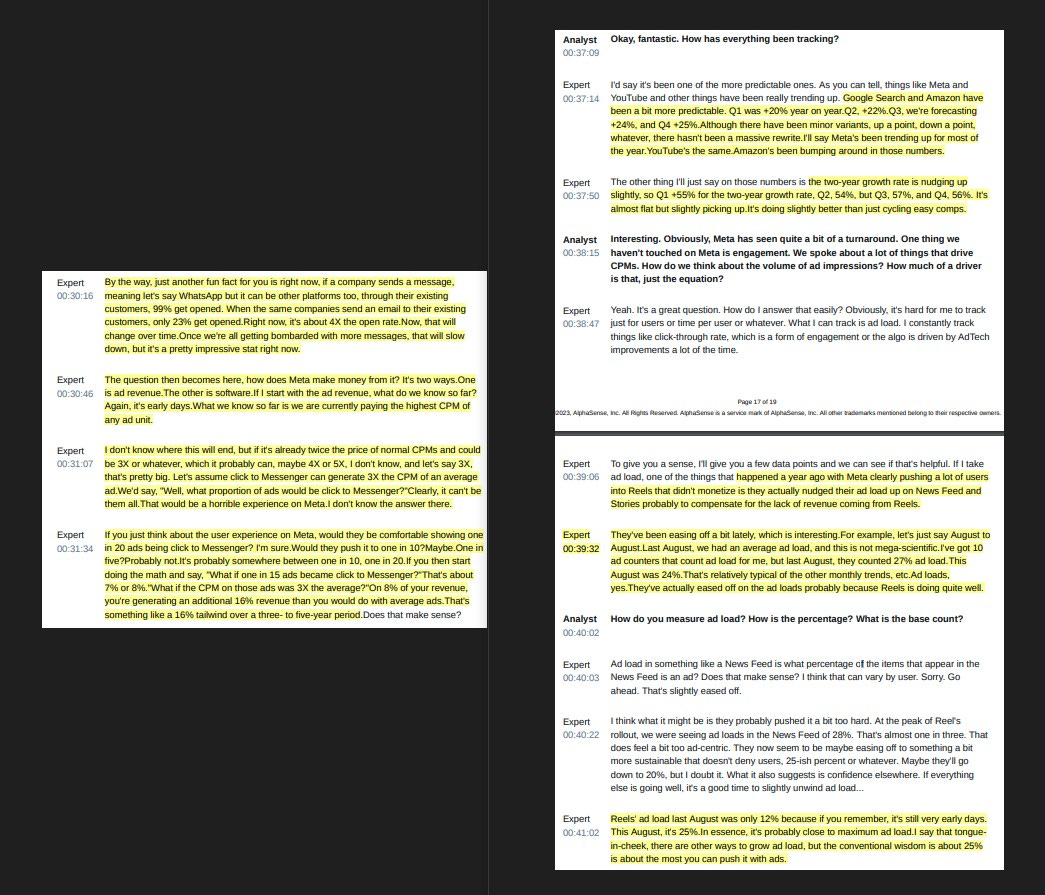
An interview with a Former Sr. Director at Google who worked on Google’s TPU business as one of the first employees:
When TPUs were first implemented for the use of Google's internal products like Google Translate, using their own TPUs vs outside chips brought a 40x improvement of the value that it gave to Google. The metric was based on how much compute power you get for the total cost of ownership of that chip.
The 40x improvement vs outside chips has since come down more in recent years.
According to the expert, you can’t do a chip in under 12 months. The sweet spot is 12-18 months to catch the right cycle. You also have to coordinate your efforts based on when the new Taiwan Semiconductor Manufacturing Company chip comes out.
Google's advantage is that they are “full-stack.” They are building the data center, racks (the racks are Google's own design), they are building code, etc.
According to his knowledge from the past, TPUs are better than Nvidia chips when it comes to large models, whereas Nvidia outperformed on smaller models. The expert thinks the main advantage might be power consumption, where TPUs should be better.
The expert revealed an interesting Google policy of announcing a new TPU version when an even more recent version inside the company is almost done. The V5 TPUs that are about to come out are already quite old. When the expert himself was still working there (about a year ago), the team already finished the product.
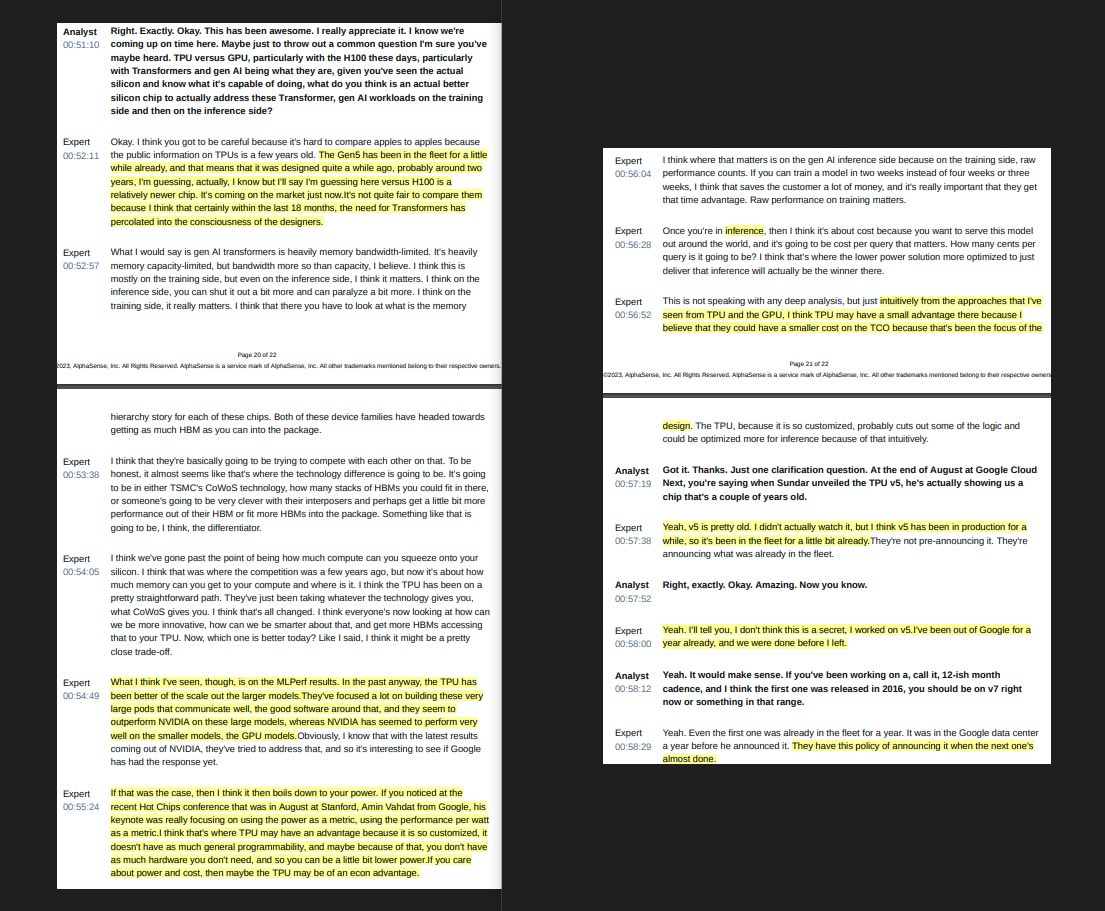
A former engineer at Palantir who worked there for 7 years shares his view on the company and the competitive landscape:
Palantir in the last years has significantly improved the speed of deployment of its Foundry platform at clients. When they rolled out multi-tenancy, that helped a lot with deployment. Regarding on-prem, the biggest bottleneck is usually the client's procurement.
In the expert’s experience, when it comes to Palantir competitors, it’s often the clients themselves who think they can build a similar platform with OS tools. But that doesn’t really work on the cost-benefit side. From other companies, Databricks would be the closest to a competitor in a sense, but it lacks the permissioning flows in Foundry and the concept of ontology.
When the expert was still there about a year ago Palantir's momentum was accelerating. When he started, there were large teams per deployment of 8-10 engineers working with one client; by the time he left, that had dropped to 2 engineers per client.
The best vertical for Palantir is manufacturing so far. Where is the vertical that didn’t really take off that much is financial institutions, where oftentimes Palantir helps with compliance, which is a cost center, not a money-making side of the business.
The expert thinks that Palantir "is a platform way ahead of anything else in the market, and that there is a moat."
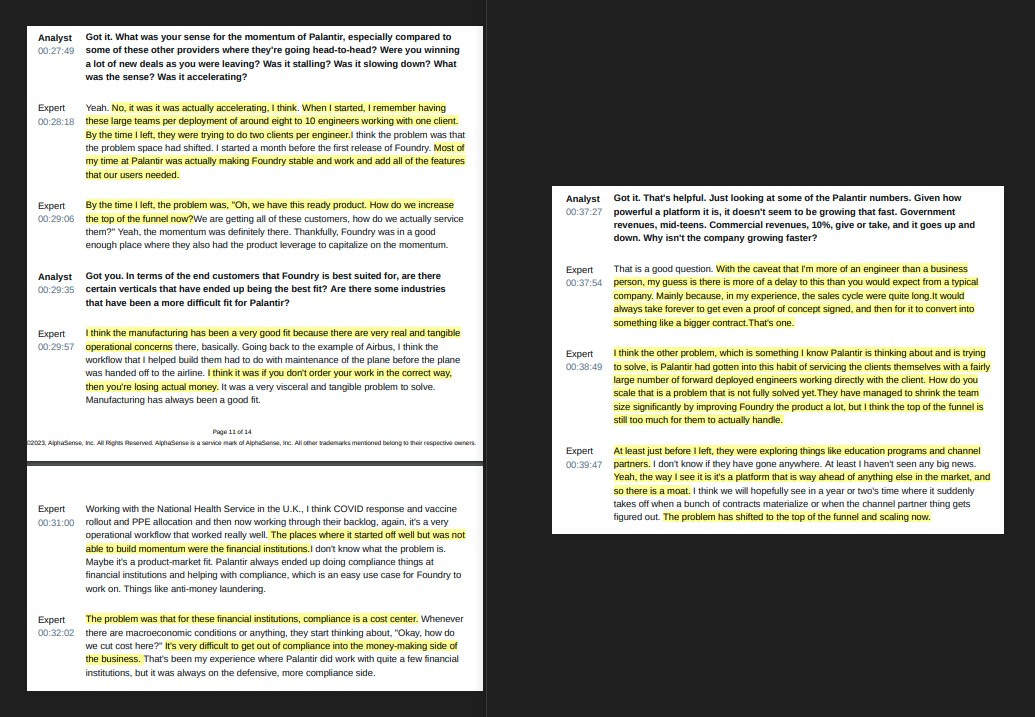
Most impactful news of the week
Microsoft’s Activision Buy Extends Nadella’s Decade of Deals
Microsoft completed its $75 billion acquisition of Activision Blizzard, marking its largest deal in its nearly 50-year history. This acquisition, which took 21 months to navigate through various global regulatory processes, positions Microsoft at the forefront of industries from video games to artificial intelligence. By adding Activision's popular franchises such as Call of Duty and Candy Crush, Microsoft's video game business is set to grow by more than half, surpassing $24 billion in value. The additions will also move the business away from Xbox consoles and toward gaming content across platforms and devices.
Google Ad Changes Leave Marketers Flying Blind
Google has made significant changes to its advertising platform, limiting the transparency marketers have regarding their advertising spending. These changes have raised concerns among advertisers, with Kinshuk Jerath, a marketing expert from Columbia Business School, stating that Google's auctions are not transparent and the company wields considerable control over the rules and outcomes of these auctions. This testimony was presented as part of the ongoing antitrust trial involving Google, initiated by the US Justice Department.
Even Google Insiders Are Questioning Bard AI Chatbot’s Usefulness
For months, Google and Discord Inc. have run an invitation-only chat for heavy users of Bard, Google’s artificial intelligence-powered chatbot. Within this forum, Google's product managers, designers, and engineers engage in open discussions about the effectiveness and utility of the AI tool. Some participants have expressed skepticism, with one senior product manager, Dominik Rabiej, noting that he doesn't trust the output of large language models like Bard unless it can be independently verified. These discussions highlight the ongoing debate within the team about the development and capabilities of AI models like Bard.
Qualcomm to cut roughly 1,258 jobs in California
Semiconductor manufacturer Qualcomm is cutting approximately 1,258 jobs in two of its California offices, as reported in recent filings with the California Employment Development Department. With a workforce of around 51,000 employees as of September 2022, these cuts represent approximately 2.5% of their workforce. Qualcomm plans to eliminate roughly 1,064 employees in San Diego and 194 employees in Santa Clara, with the layoffs scheduled to take effect around December 13 in both locations. The company has been exploring new markets for revenue generation, such as virtual reality headsets and AI chips for data centers, but has faced challenges in these efforts.
IRS says Microsoft owes an additional $29 billion in back taxes
Microsoft has disclosed in an 8-K filing that it received Notices of Proposed Adjustment from the Internal Revenue Service (IRS) for an additional tax payment of $28.9 billion. This dispute centers around the allocation of Microsoft's profits among different countries and jurisdictions during the period from 2004 to 2013. Microsoft emphasized that up to $10 billion in taxes the company has already paid were not considered in the IRS's proposed adjustments. The company intends to challenge these notices through the IRS's administrative appeal process and is prepared to take the matter to judicial proceedings if necessary.
AMD to acquire AI software startup as it seeks to catch up with Nvidia
Advanced Micro Devices (AMD) has announced its acquisition of Nod.AI, an open-source artificial intelligence software startup to expand the chipmaker’s AI software operations. Nod.AI, or Nod Labs, builds open-source technologies “for future AI systems,” according to the startup, and it mainly specializes in reinforcement learning, a type of system that “learns” via trial and error. The acquisition is aimed at enhancing AMD's competitive position against its rival chipmaker Nvidia, which has reported significant revenue growth. The acquisition is expected to be finalized during this quarter.
Amazon hikes pay in the UK, plans to hire 15,000 seasonal workers ahead of the holidays
Amazon is planning to raise the pay for its operations workers in the United Kingdom and hire an additional 15,000 staff in preparation for the holiday season. The company announced that it will increase the base pay for frontline operations workers, including full-time, part-time, temporary, and seasonal employees, to a range of £11.80 to £12.50 per hour, depending on the location, starting from October 15. By April 2024, Amazon plans to further increase the pay to a range of £12.30 to £13 per hour. The move represents a £170 million investment in pay and aims to meet the increased demand leading up to Christmas.
Netflix is planning to launch retail destinations in 2025
Netflix is reportedly planning to open retail destinations called "Netflix House," offering a combination of items for purchase, food, and experiences related to popular Netflix content. While specific details about the locations and their offerings remain limited, the first Netflix House locations are expected to launch in the United States in 2025. This move into physical retail experiences could provide a new way for Netflix to engage with its audience and promote its content.
Google announces new generative AI search capabilities for doctors
Google Cloud has unveiled AI-powered search capabilities designed to assist healthcare professionals in efficiently accessing accurate clinical information from diverse medical records. Healthcare providers often have valuable data stored in various systems and formats, making it challenging for clinicians to access critical information. Google Cloud's new search tool aims to streamline the process, allowing doctors to retrieve information from clinical notes, scanned documents, and electronic health records, all accessible from a single location. This development is expected to save healthcare workers time and enhance their efficiency.
OpenAI’s Revenue Crossed $1.3 Billion Annualized Rate, CEO Tells Staff
OpenAI, the creator of ChatGPT, has been generating revenue at an impressive pace of approximately $1.3 billion per year, as revealed by CEO Sam Altman. This figure implies monthly earnings of over $100 million, representing a 30% increase from the $1 billion annual revenue pace recorded in the summer. This surge in revenue is mainly attributed to subscriptions for its conversational chatbot, which has shown significant demand since the launch of the paid version in February. For all of last year, the company’s revenue was just $28 million. Since the release of ChatGPT, OpenAI has become a closely watched barometer of demand for artificial intelligence that can help software developers code faster and help business managers quickly summarize documents or generate blog posts and advertising materials.
Hidden gems
Nvidia Cloud Ally Nears $300 Million Financing
Lambda Labs, which competes with Amazon Web Services in renting out servers with Nvidia chips to developers of artificial intelligence, is nearing a $300 million equity financing, according to two people with direct knowledge of the matter. One of these people said that an investment fund led by billionaire Thomas Tull plans to fund a substantial part of the round. Nvidia was previously in talks to fund Lambda, but the chip designer isn’t expected to participate in the round, one of the people with direct knowledge said.
Adobe May Be Tech’s Biggest AI Bet Yet
Adobe recently hosted its annual user conference, Adobe Max, where it unveiled various new AI tools and services. The company also held a three-hour meeting for financial analysts, although it didn't provide financial reports or projections. Adobe emphasized that its fiscal fourth quarter, ending in six weeks, is expected to be strong. Interestingly, Adobe's approach differed from last year, where it presented detailed revenue and earnings projections for the coming fiscal year. Additionally, Adobe didn't focus on the topic of Figma, its significant acquisition still awaiting regulatory approval more than a year after its announcement. Adobe's creative offerings continue to evolve with the introduction of the second generation of the Firefly image generation tool. This tool, which began beta trials earlier this year, now offers new versions for audio, video, and 3D image creation. Additionally, new AI features in Photoshop aim to significantly reduce the time required for the editing process.
YouTube passes Netflix as top video source for teens
A recent survey conducted by investment bank Piper Sandler reveals that teenagers in the U.S. are now spending more time watching videos on YouTube than on Netflix. According to the survey, teens allocate 29.1% of their daily video consumption time to Google-owned YouTube, while Netflix occupies 28.7% of their viewing time. Notably, the time spent on YouTube has increased since the spring, gaining almost a percentage point, while Netflix has seen a decline of over two percentage points. This shift highlights the intensifying competition in the streaming industry and underscores YouTube's strong position as a free source of online video content, particularly among younger audiences.
Thanks for reading Uncover Tech Insights! Subscribe for free to receive new posts and support my work.
We would really appreciate it if you could share it with someone you know who would be interested in tech investing news. Organic, and especially word of mouth, is the main way our newsletter will grow. We will always put quality before quantity. Thank you.
Source: the expert interviews are found on Alphasense, a platform specialized for expert interviews and other investment data.
Disclaimer:
Nothing contained in this website and newsletter should be understood as investment or financial advice. All investment strategies and investments involve the risk of loss. Past performance does not guarantee future results. Everything written and expressed in this newsletter is only the writer's opinion and should not be considered investment advice. Before investing in anything, know your risk profile and if needed, consult a professional. Nothing on this site should ever be considered advice, research, or an invitation to buy or sell any securities.

